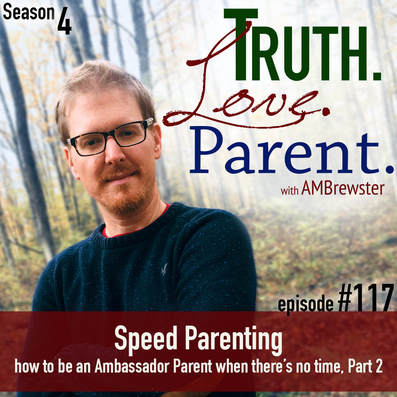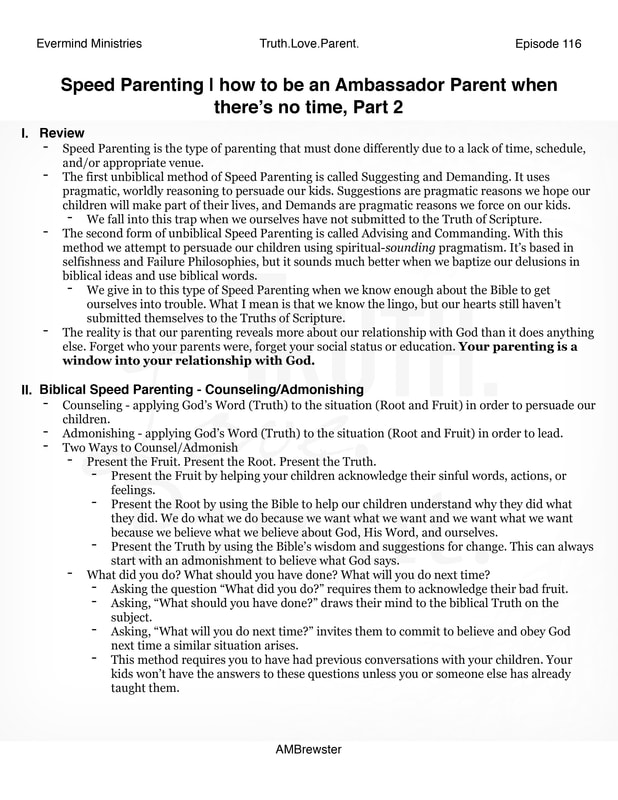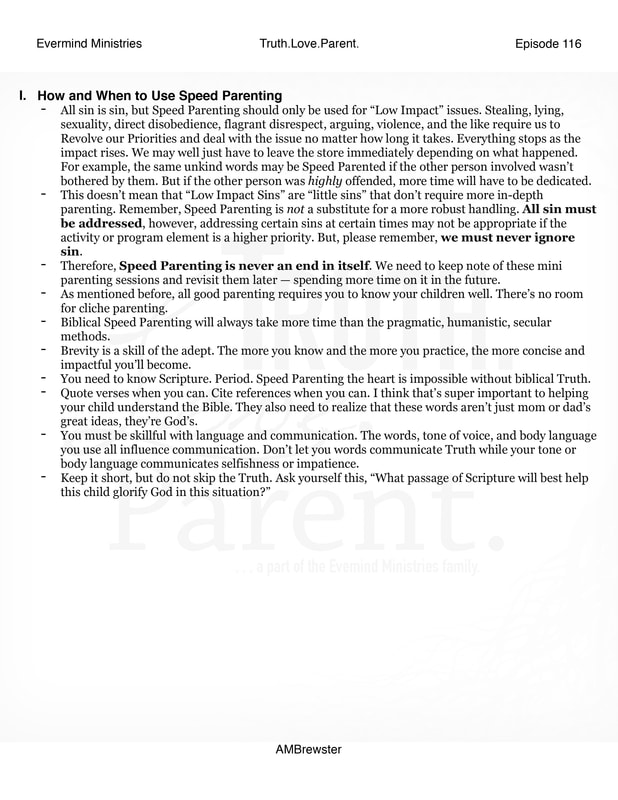 Join us for the conclusion of Speed Parenting. Today we share a Speed Parenting model that glorifies God and give you tips for how and when to Speed Parenting. Being a Christian parent is incredible because God’s Truth provides us a framework for all we do. Check out 5 Ways to Support TLP. Like us on Facebook. Follow us on Twitter. Follow AMBrewster on Twitter. Follow us on Pinterest. Subscribe on YouTube. Need some help? Write to us at [email protected]. Click "Read More" for today’s Episode Notes and Transcript. Episode NotesTo download this document, please right-click and select "Save Image As." TranscriptIntroductionWelcome back! Last time we did part one of Speed Parenting. Please listen to the last episode if you haven’t heard it already. And if you haven’t listened to The Merest Christianity study that started on episode 95, you really need to check that out before continuing with this discussion. Everything we’re talking about today is founded on that study; if you don’t understand it, today likely won’t be as helpful as it needs to be, and it may well be slightly confusing. But before we continue, I’d like to remind you to share these episodes on social media. It’s super easy to do from the Apple Podcasts app, and it’s also easy from our podcast host, PodOmatic. So, share away! And, if you share one of our episodes, will you please tag Truth.Love.Parent. in the post? You can tag us on Facebook and Twitter by using the @ sign and by typing TruthLoveParent with no periods or spaces. Okay, so last time we talked about two unbiblical Speed Parenting Models, and today I want to present at least one Speed Parenting model that is Christ-honoring. TopicBefore we jump in, though, let's take a moment to review that about which we talked last time. First, we defined Speed Parenting as the type of parenting that must done differently due to a lack of time, schedule, and/or appropriate venue. Unfortunately this defines too much of our parenting. What with the kids in school all day and our ridiculously busy family schedules and the fact that too many of us have forgotten how to really relate to each other . . . how much of our parenting is actually done with intentionality and time? Well, the first unbiblical method of Speed Parenting is called Suggesting and Demanding. It uses pragmatic, worldly reasoning to persuade our kids. Suggestions are pragmatic reasons we hope our children will make part of their lives, and Demands are pragmatic reasons we force on our kids. We fall into this trap when we ourselves have not submitted to the Truth of Scripture. The second form of unbiblical Speed Parenting is called Advising and Commanding. With this method we attempt to persuade our children using spiritual-sounding pragmatism. It’s based in selfishness and Failure Philosophies, but it sounds much better when we baptize our delusions in biblical ideas and use biblical words. We give in to this type of Speed Parenting when we know enough about the Bible to get ourselves into trouble. What I mean is that we know the lingo, but our hearts still haven’t submitted themselves to the Truths of Scripture. As a side note, the reality is that our parenting reveals more about our relationship with God than it does anything else. Forget who your parents were, forget your social status or education. Your parenting is a window into your relationship with God. Both of these Speed Parenting models fall short because they neglect to motivate our children’s behavior with a proper heart. If you remember The Merest Christianity, it’s the same as ripping the bad fruit off the tree and attempting to duct tape good fruit on the branches. The tree is still diseased and corrupt, but the fruit looks prettier. Instead, all of our parenting needs to get to the root of the problem. Our children do what they do and say what they say and feel what they feel because they want what they want. And they want what they want because they believe what they believe about God, His Word, and themselves. That’s the root of the problem. Now, to be fair, that type of parenting is hard even when we have plenty of time on our hand! Parenting like this in a pinch is much more difficult. It requires not only a knowledge and understanding of the Bible, but a submitted, wise, and growing heart. But isn’t that why we’re all here? Truth.Love.Parent. doesn’t exist to merely encourage all us perfect parents to keep being perfect. No. We’re all bruised and broken. We all need the grace of God. We’re all growing. We’re here to confront and challenge and admonish each other. We’re here because we’re serious about becoming more like Christ and stewarding our families. We’re here because we’re not perfect, but we love God enough to want to know Him more and love Him with all our hearts and souls and minds and strength. So, let’s engage in that process as we discuss a Christ-honoring Speed Parenting model. I’m going to call it the Counseling and Admonishing model. As before, I’m using these words in a slightly different way than most people use them. However, my use is not inaccurate. In fact — I believe it appreciates the nuances of the words. When I use the word Counsel, I’m referring to us applying God’s Word (Truth) to the situation (Root and Fruit) in order to persuade our children. We’re no merely using biblical ideas and words to manipulate our kids to do what we want. This is the sanctified version of Suggesting and Advising. And when I use the word Admonish, I’m referring to applying God’s Word (Truth) to the situation (Root and Fruit) in order to lead. Commanding and Demanding tried to force compliance, but Admonishment leads our children in the direction they should be going. So, now I want to share two examples of how Counseling and Admonishing Speed Parenting works and then talk briefly about how and when to use Speed Parenting. The first method is my favorite; I call it “Present the Fruit. Present the Root. Present the Truth.” So, let’s say my child and I are in a store and she sticks her hand out of the cart and knocks some food onto the floor. Now, I start with a simple example just to get the ball rolling. So, the first step is to Present the Fruit. I want to pick the most tangible sinful word, action, or emotion. Now, this situation, as simply as it may seem obviously has it’s complexities. How old is the child? Have we had a previous conversation where I explained proper shopping etiquette? Did I just tell her to touch the food on the shelves? So, let’s say she’s five years old, we’ve had many conversations about touching things that don’t belong to her, and — in fact — this is her second time knocking something off the shelf since we’ve been in the store. Now, our natural reaction is to screw our faces up and say, “Stop it!” like so many others. But I want to do this the right way, so I acknowledge that her fruit is disrespect and disobedience. Unless I’m certain she was deliberately trying to be destructive, I probably won’t highlight that aspect, but I could definitely pick the fruit of poor stewardship or being rude to the people who own the store. So I may lower my voice and come right down to where she is and lovingly say, “Sweetheart, you have been told not to touch the things on the shelf. You’re being disobedient and disrespectful.” Then I need to present the root. I need to help her interpret her actions in light of reality — and reality is always what God says it is. Use the Bible’s explanation of their motivation. For example: James 4 tells us we fight and argue, not because of what the other person did or because how we felt or because our parents spanked us as children, but because we’re spiritual adulterers who care more about ourselves than God. I may say to my daughter, “You’re being disobedient because you want to do what you want to do, and you’re being disrespectful because you don’t care to make my wishes as important as you should. But the biggest problem is not how you’re treating me or what you’re doing to the food on the shelves. The biggest problem is that you’re not believing it’s important to obey God when He says, “Children obey and honor your parents.’” This step goes straight to the biblical evidence that reveals why we do what we do. And then I share the Truth. When I say, the Truth, I’m not suggesting that everything else has been lie. I’m referring to the Truth that will help my child believe God’s Word and live accordingly. And this step is generally pretty easy if I did the “Present the Root” part correctly. So, when I Present the Truth, I want to apply the Scripture that’s the most applicable to the individual in the moment. The more you know about the sin, the biblical information on the subject, and the child, the better you will be at this step. For example: “Now, like I said, God tells us, “Children obey your parents in the Lord, for this is right. Honor your father and mother that it may go well with you.” You need to obey God and listen to Daddy. Please do not touch anything outside of the cart.” Now, two observations: 1. That took longer than it normally would because I added all that commentary. 2. There are so many other things I could have said. I may have also had to say something about a consequence for her actions, I may have had to comment on her attitude at being corrected. I may have had to use Revolving Priorities from episode 39 to address a deeper issue that only revealed itself as I tried to Speed Parent there first issue. My point here is not to provide a script. I merely want to illustrate how we can quickly get to the heart even in a short period of time. So, let me give you a couple other examples. “Whoa, what you just said was very unkind. It didn’t build your brother up at all. But the real problem is that you don’t think it’s important to obey God when He says to be edifying. The reality is that you need to be loving — even when people are unkind to you — because God expects us to love. He loves us when we rebel against Him — like you just did when you tore down your brother. But you can’t do it in your own power. And, listen, you going to need to apologize for what you said.” “Wow,” you say, “that sounded quick and preachy.” What would you suggest? “Cut it out!” This version of Speed Parenting motivates my child to obey out of fear of me. “I told you not to say that to your brother!” This version motivates my child to obey me because of me. “Go to your room!” This version drives straight to penalty with no thought given to correction. “Do you want people talking to you like that?” This version motivates my child to do right because of what he’ll get out of it. Again, these aren’t scripts. There’s not even the best examples. I just want us to see that we can get from the fruit to the root to the Truth in a short period of time. Here’s another one: “Come here a second. That look you just gave me was very disrespectful. But this doesn’t have anything to do with your attitude to my authority. I’m nobody special. I’m just your dad. This has to do with your rebellion to God. And I know it’s hard to want to obey someone you don’t like and someone you disagree with. But here’s the issue: you cannot really have success in this area unless you first submit to God’s authority. You’re going to continue rejecting me and teachers and counselors until you realize God’s the one who should be running your life. I’d want to talk to you more about this later, but for now I want you to just think about what I said. Figure out if you think I’m right or wrong. Then when we talk later, you can give me your thoughts.” Remember, this is Speed Parenting. This is parenting when there seems to be no time. I likely would not have this conversation if we were in the right place at the right time. Okay, so that’s an example of “Present the Fruit. Present the Root. Present the Truth.” Let me give you one more example of the Counseling and Admonishing model. This one is called “What did you do? What should you have done? What will you do next time?” I don’t like this as much or use it as often. This one is really quick, but it’s only for beneficial for a believer who’s already been taught the Root Truth underlying his Fruit. What I’m saying is, you have to lay a good foundation with your kids in order for this Speed Parenting Model to work. I will say, in theory, this is very similar to the other method, but this time you’re calling on the individual to provide the answers. This isn’t helpful if the child doesn’t already have the answers. So, going back to my daughter in the shopping cart. For this example my daughter, Ivy is going to help me out. Ivy is eight. Why don’t you say “Hi,” Sweetie. Ivy: “Hi!” Okay, so . . . Daddy: “What did you just do?” Ivy: “I touched the food on the shelf.” Daddy: “What should you have done?” Ivy: “I should have obeyed.” Daddy: “What will you do the next time you’re tempted to disobey?” Ivy: “I’ll remember what God says about obeying and honoring my parents.” Good job, Ivy! Thank you! Bye. You see how that method requires you to have previous conversations with your children. Like I said, it’s faster, but you need to lay a good foundation. I will say, though, that so much of our parenting is repeating ourselves, that this method provides some occasional variety for issues where your kids know better than they act. Alright, let’s finish with ten really important tips for how and when to use Speed Parenting.
ConclusionI know I just spent a lot of time talking about something called “Speed” Parenting, but I hope it was worth it. Please download today’s episode notes from Taking Back the Family. You can find the link in the description.
And please share this episode with your friends on social media. Our next episode is called “Stop Trying to Buy Your Kids.” There’s this cultural mentality that we show love by buying people thing. This idea has permeated the Christian world through books like “The Four Love Languages.” But is this mentality biblical? From where does it come, and is there a biblical version of it? I think this is a very beneficial talk given the time of year and I encourage you to join us next time. And, lastly, will you consider giving a year end gift to Truth.Love.Parent.? You can learn more about the 5 ways to support TLP in the link below. And — as always — never hesitate to email us at [email protected] if you have specific questions about your family. We’re here to help you become an intentional, premeditated parent. Truth is Truth all the time, and don’t let scheduling issues or time constraints keep you from taking your children back to the source of the problem: their own refusal to worship God. Trust me, you won’t regret it. See you next time.
0 Comments
Leave a Reply. |
Receive UpdatesJoin The TLP Family and receive email updates when we publish new articles and episodes.
Subscribe to Our PodcastCategories
All
Archives
July 2024
|
Truth.Love.Family.
- Truth.Love.Family.
- Donate
-
Podcast
-
Special Guests
>
- Ryan & Kim Ahrens
- Scott & Becky Aniol
- George Barna
- Dave Bender
- Alan Benson
- Carolyn Brewster
- Tim Challies
- Natasha Crain
- Kristen Clark
- Hillary Morgan Ferrer
- Todd Friel
- Ken Ham
- Jay Holland
- Kristen Jenson
- Chris Kaspar
- Becky Keife
- Heath Lambert
- Jessica Mair
- Dr. Joe Martin
- Mark Massey
- Katie Miller
- Jim Newheiser
- Steve Pettit
- Shannon Popkin
- Aaron & Elaina Sharp
- Mark Shaw
- Lynna Sutherland
- Nathan & Anna Sutherland
- Brandon Talley
- Arthur C. Woods
- Episodes by Series
- Episodes by Topic
- Where to Listen
-
Special Guests
>
- Community
-
Resources
- Counseling
- Speaking
- The Celebration of God
- AMBrewster.com
- Evermind Store
|
To submit general questions or ideas for future episodes: [email protected]
To request specific assistance for your family: [email protected] |
We are a participant in the Amazon Services LLC Associates Program. As an Amazon Associate, we earn from qualifying purchases. Click any Amazon link at TruthLoveParent.com, shop as usual, and TLP will receive commissions off all of your sales! Click here to learn more.
Site powered by Weebly.








 RSS Feed
RSS Feed
